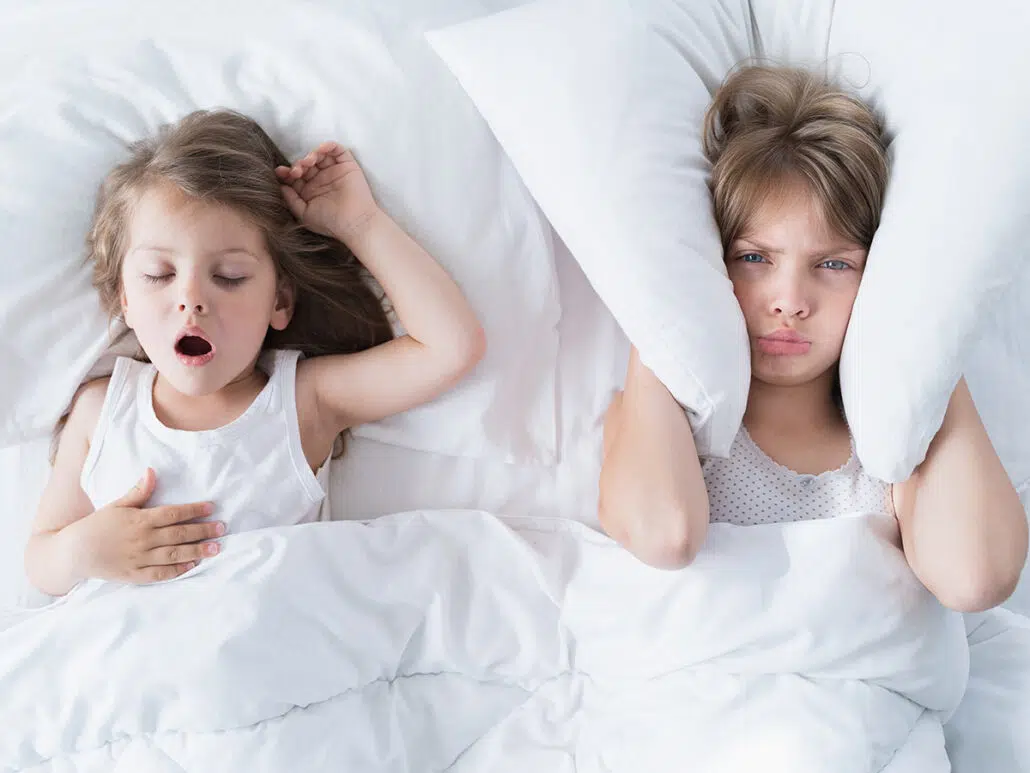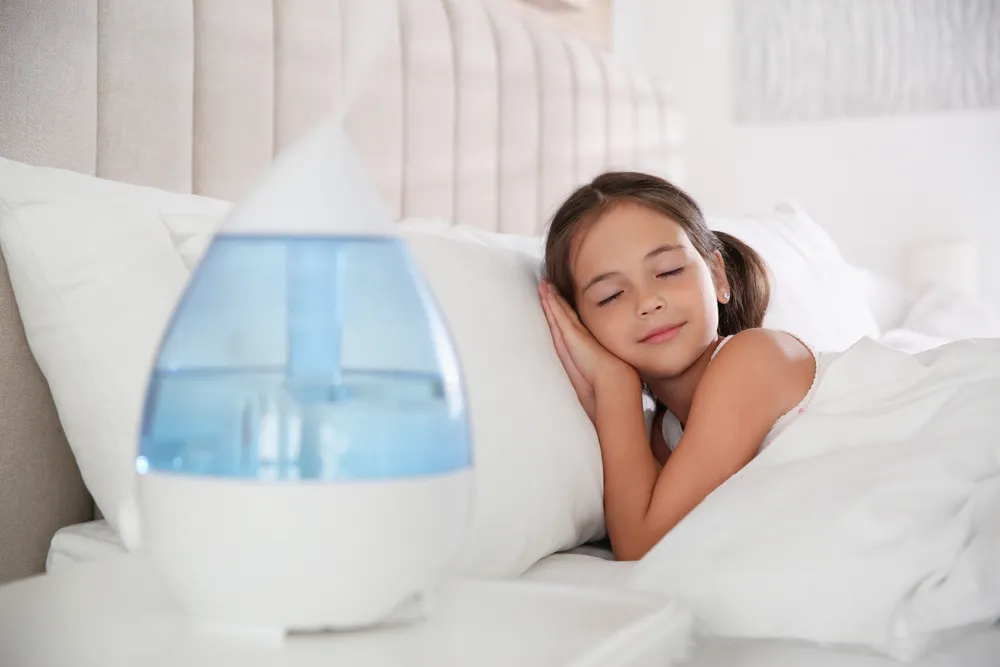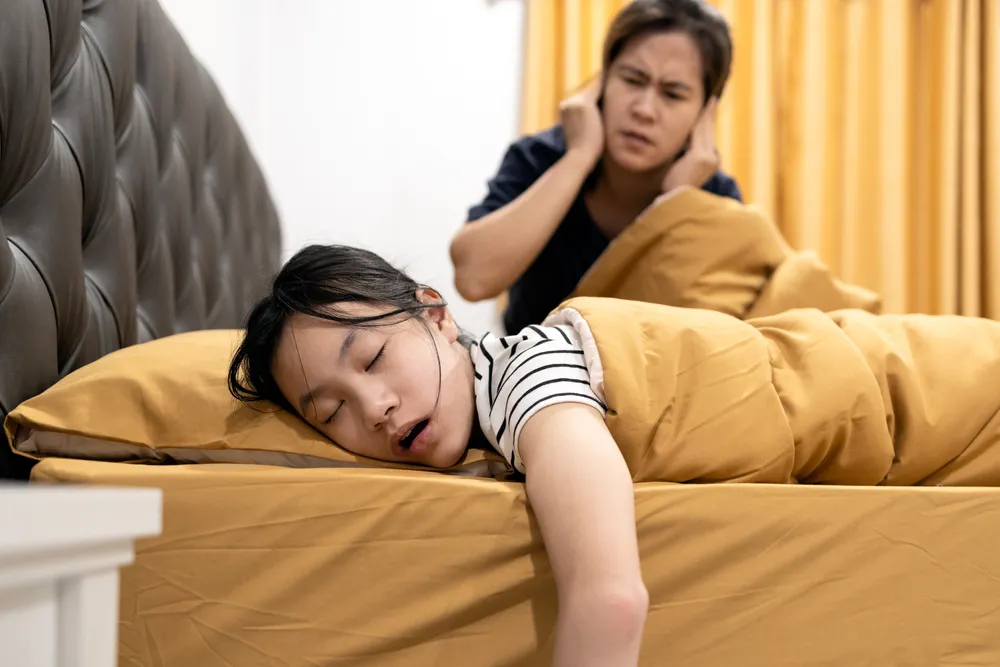The information provided below and throughout this website is presented for general educational purposes only and does NOT constitute professional medical advice. This information is NOT a substitute for professional medical advice and NO material on this site is intended to be a substitute for professional medical advice. Always seek the guidance of your doctor or other qualified health professional with any questions you may have regarding a health or a medical condition. Never disregard the advice of a medical professional or delay in seeking it because of something you have read on this website.
Snoring is often considered a common annoyance in adults, but when it comes to children, it can be a source of significant concern for parents. Understanding why your child snores and finding effective remedies is crucial for ensuring their health and well-being. Snoring in children can be more than just a noisy nuisance; it can indicate underlying health issues that require attention.

How to Stop Snoring in Kids
Snoring in children is a common concern for many parents. It can disrupt sleep, affect academic performance, and even lead to long-term health issues.
Pediatric ENT specialists at Penn Medicine Becker ENT & Allergy provide treatment plans and guidance to alleviate or stop childhood snoring. This ultimate guide will provide you with essential information on the causes, effects, and treatment options for snoring in kids.
What Causes Snoring in Kids?
Snoring in children is often caused by a partial blockage of the airway during sleep. This can happen for a variety of reasons, including:
- Enlarged tonsils or adenoids
- Obesity
- Allergies or sinus problems
- Obstructive sleep apnea
- A deviated septum
- A narrow or small airway
It is essential to identify the specific cause of your child’s snoring to determine the appropriate treatment options.
What Are the Effects of Snoring on Kids?
Snoring can have several negative effects on a child’s health, well-being, and overall development. Some of the most common effects include:
Sleep Disruption
Snoring can lead to frequent awakenings and poor sleep quality, causing fatigue and sleepiness during the day.
Poor Academic Performance
Children who snore may have difficulty concentrating and retaining information, leading to poor academic performance.
Behavioral Issues
Snoring can contribute to irritability, mood swings, and other behavioral issues in children.
Heart Disease Risk
Chronic snoring can increase the risk of developing heart disease later in life.
Developmental Delays and Speech Difficulties
Snoring can interfere with the quality of sleep, leading to developmental delays and speech difficulties in some cases.
Mental Health Issues
Children who snore may be at a higher risk for developing mental health issues, such as anxiety and depression.
How to Identify and Treat Snoring in Kids
If you suspect that your child may be snoring, it is essential to consult with an ENT specialist. They will likely perform a physical examination and may recommend additional tests, such as a sleep study, to determine the cause of the snoring.
Treatment options for snoring in children depend on the underlying cause. Some potential treatments include:
- Tonsillectomy or adenoidectomy (surgical removal of enlarged tonsils or adenoids)
- Weight loss and lifestyle changes for children who are overweight or obese
- Allergy or sinus treatment
- Continuous positive airway pressure (CPAP) therapy for sleep apnea
- Surgical correction of a deviated septum

Home Remedies for Stopping Snoring in Kids
There are several home remedies that can help reduce snoring in children. Some of these include:
Sleep Position Adjustments
Encourage your child to sleep on their side or use a pillow to elevate their head, as this can help open up the airway and reduce snoring.
Humidifiers
Using a humidifier in your child’s bedroom can help alleviate snoring by keeping the air moist and reducing irritation in the nasal passages.
Allergy and Sinus Treatments
If allergies or sinus problems are contributing to your child’s snoring, over-the-counter or prescription medications may help.

Avoiding Dairy Products Before Bedtime
Dairy products can increase mucus production, which can contribute to snoring. Encourage your child to avoid dairy products before bedtime.
Saline Nasal Sprays and Drops
Using saline nasal sprays or drops can help clear mucus from your child’s nasal passages, reducing snoring.
Neti Pot Usage
A neti pot can be used to rinse the nasal passages with a saline solution, helping to clear congestion and reduce snoring.
Mouth Exercise Routines
Certain mouth exercises can help strengthen the muscles in the throat and reduce snoring. Consult with a healthcare professional for specific exercises appropriate for your child.
When to Seek Professional Help for Child Snoring
While many cases of snoring in children can be managed with home remedies and lifestyle changes, there are certain situations where professional medical evaluation is crucial. If you observe any of the following signs or if home remedies do not alleviate your child’s snoring, it is important to seek professional help:
Persistent Snoring
If your child’s snoring persists for more than a few weeks despite trying various home remedies, it may indicate an underlying issue that requires medical attention. Chronic snoring can be a sign of conditions such as sleep apnea, which needs to be evaluated by a healthcare professional.
Loud and Frequent Snoring
Loud and frequent snoring, especially if it occurs nightly, can be a red flag. This level of snoring can disrupt your child’s sleep quality and overall health. A healthcare provider can help determine the cause and recommend appropriate treatment options.
Difficulty Breathing During Sleep
Observe your child for any signs of breathing difficulties during sleep, such as pauses in breathing, gasping, or choking. These symptoms can indicate obstructive sleep apnea, a serious condition that requires medical intervention.

Daytime Sleepiness or Behavioral Issues
Snoring can affect the quality of your child’s sleep, leading to excessive daytime sleepiness, irritability, difficulty concentrating, or other behavioral issues. If you notice these symptoms, it is important to consult a healthcare professional to address potential sleep-related disorders.
Poor Growth and Development
In some cases, snoring can be associated with poor growth and development. If you notice that your child is not growing as expected or is falling behind in developmental milestones, seek medical advice to rule out any underlying health issues.
Complications from Underlying Conditions
If your child has existing medical conditions such as asthma, allergies, or nasal congestion that contribute to snoring, it is essential to work with a healthcare provider to manage these conditions effectively. Addressing the root cause can help reduce or eliminate snoring.
How to Help Your Child Live a Healthier Life Free from Snoring

Helping your child live a healthier life free from snoring involves addressing the underlying causes and promoting healthy habits. Some tips include:
- Encourage regular exercise to maintain a healthy weight and strengthen respiratory muscles.
- Establish a consistent sleep schedule and bedtime routine to promote better sleep quality.
- Limit screen time before bed, as the blue light emitted from devices can interfere with sleep.
- Create a comfortable and quiet sleep environment by reducing noise and maintaining a cool room temperature.
- Encourage a balanced diet that includes fruits, vegetables, whole grains, and lean proteins to support overall health.
Strategies for Reducing Snoring in Children
There are several strategies that can help reduce snoring in children, including:
- Using a white noise machine or fan to drown out snoring sounds and promote a more restful sleep environment.
- Encouraging your child to practice good nasal hygiene by blowing their nose regularly and using saline sprays or rinses as needed.
- Teaching your child relaxation techniques, such as deep breathing exercises, to help them relax before bedtime.
- Monitoring your child’s caffeine intake, as caffeine can disrupt sleep patterns and contribute to snoring.
- Encouraging your child to avoid smoking or exposure to secondhand smoke, as it can cause inflammation in the airways and increase the risk of snoring.
What Are the Long-Term Effects of Unchecked Snoring?
If left untreated, snoring in children can lead to long-term effects on their health and well-being. Some of these effects include:
- Persistent sleep disruption, leading to chronic fatigue and daytime sleepiness.
- Increased risk of developing sleep apnea, a serious sleep disorder that can cause breathing difficulties and other health complications.
- Impaired cognitive function, leading to difficulties with memory, concentration, and problem-solving.
- Increased risk of developing hypertension, heart disease, and stroke later in life.
- Social and psychological issues, such as embarrassment, social isolation, and low self-esteem.
How to Encourage Positive Habits to Stop Snoring in Kids
Encouraging positive habits in your child can help them stop snoring and improve their overall health. Some suggestions include:
- Teach your child the importance of good oral hygiene, as poor oral health can contribute to snoring.
- Encourage your child to drink plenty of water throughout the day to stay hydrated and maintain healthy mucus production.
- Help your child establish a regular exercise routine to promote better sleep and overall health.
- Teach your child stress management techniques, such as mindfulness or meditation, to help them relax before bedtime.
- Encourage open communication about snoring and its effects on their health, and involve your child in the process of finding solutions to their snoring.
Importance of Medical Evaluation
A professional evaluation by an ENT specialist or a sleep specialist can help identify the underlying cause of your child’s snoring. The healthcare provider may recommend diagnostic tests, such as a sleep study (polysomnography), to monitor your child’s sleep patterns and breathing. Based on the findings, they can suggest appropriate treatments, which may include:
- Medical interventions (e.g., nasal corticosteroids, allergy treatments)
- Lifestyle modifications (e.g., weight management, positional therapy)
- Surgical options (e.g., tonsillectomy, adenoidectomy) for severe cases
Seeking professional help ensures that your child receives the most effective treatment, improving their sleep quality and overall well-being. Remember, early intervention can prevent potential complications and promote healthier sleep habits for your child. Schedule your consultation with our ENT professionals and improve your child’s health.

